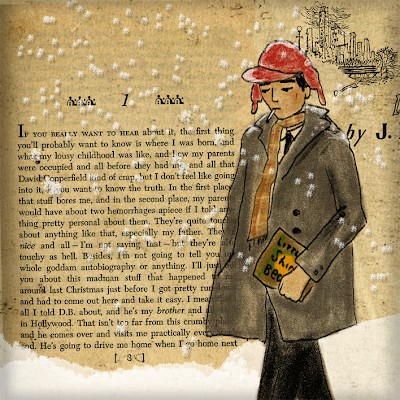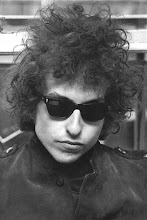
jueves, 23 de febrero de 2012
jueves, 16 de febrero de 2012
I have spoken too long for a writer.
Tengo planes para un par de posts que podrían ser algo interesantes. Aún me falta un poco más de información para escribirlos, pero aseguro que los haré. Sí, sí, sí. Es necesario.
Mientras, para dar algo de oxígeno, comparto este breve y hermoso fragmento del discurso de agradecimiento que Hemingway compuso cuando ganó el premio sueco. It is fine writing:
No writer who knows the great writers who did not receive the Prize can accept it other than with humility. There is no need to list these writers. Everyone here may make his own list according to his knowledge and his conscience.
It would be impossible for me to ask the Ambassador of my country to read a speech in which a writer said all of the things which are in his heart. Things may not be immediately discernible in what a man writes, and in this sometimes he is fortunate; but eventually they are quite clear and by these and the degree of alchemy that he possesses he will endure or be forgotten.
Writing, at its best, is a lonely life. Organizations for writers palliate the writer's loneliness but I doubt if they improve his writing. He grows in public stature as he sheds his loneliness and often his work deteriorates. For he does his work alone and if he is a good enough writer he must face eternity, or the lack of it, each day.
For a true writer each book should be a new beginning where he tries again for something that is beyond attainment. He should always try for something that has never been done or that others have tried and failed. Then sometimes, with great luck, he will succeed.
How simple the writing of literature would be if it were only necessary to write in another way what has been well written. It is because we have had such great writers in the past that a writer is driven far out past where he can go, out to where no one can help him.
Mientras, para dar algo de oxígeno, comparto este breve y hermoso fragmento del discurso de agradecimiento que Hemingway compuso cuando ganó el premio sueco. It is fine writing:
No writer who knows the great writers who did not receive the Prize can accept it other than with humility. There is no need to list these writers. Everyone here may make his own list according to his knowledge and his conscience.
It would be impossible for me to ask the Ambassador of my country to read a speech in which a writer said all of the things which are in his heart. Things may not be immediately discernible in what a man writes, and in this sometimes he is fortunate; but eventually they are quite clear and by these and the degree of alchemy that he possesses he will endure or be forgotten.
Writing, at its best, is a lonely life. Organizations for writers palliate the writer's loneliness but I doubt if they improve his writing. He grows in public stature as he sheds his loneliness and often his work deteriorates. For he does his work alone and if he is a good enough writer he must face eternity, or the lack of it, each day.
For a true writer each book should be a new beginning where he tries again for something that is beyond attainment. He should always try for something that has never been done or that others have tried and failed. Then sometimes, with great luck, he will succeed.
How simple the writing of literature would be if it were only necessary to write in another way what has been well written. It is because we have had such great writers in the past that a writer is driven far out past where he can go, out to where no one can help him.

miércoles, 1 de febrero de 2012
comentario sobre un libro
Creo que Freedom de Jonathan Franzen es el libro más gringo que he leído. Comenzemos por lo externo: una estampa del Oprah's Book Club, #1 National Bestseller, el nombre del autor más grande que el título del libro y un gran cantidad de citas de elogios. La mayoría de los elogios son exagerados o vagos, yo me quedaría con "The first great novel of the post-Obama era."
Ahora la parte interna. Temas como la invasión de Iraq, el racismo, los iPods, el calentamiento global, el conflicto Palestina/Israel y el interminable debate entre los republicanos y los demócratas.
Un personaje es una ex-estrella del basquetbol universitario, otro un roquero indie. Hay un activista, un joven que quiere ser un millonario lo más pronto posible y una gran cantidad de políticos y empresarios que cuya vida es un constante lobbying.
La novela empieza y termina con conflictos entre vecinos.
El título lo forma una palabra muy gringa, que aparece en su himno y probablemente en todo discurso político desde que comenzó la guerra fría. Cómo olvidar las freedom fries.
La razón por la cual esta novela me parece tan gringa es porque trata (de manera muy precisa) a la clase media norteamericana. Trata con pobres y ricos también, pero enfocados en la manera que se relacionan con la clase media. En las novelas que he leído de autores como Hemingway, Faulkner, Keourac, Melville, etc. Los personajes son los que se encuentran en la periferia de la sociedad. Los marginados, los locos, los expatriados. En White Noise de DeLillo aparece la clase media, pero los personajes son lo insólito de la clase media: farsantes, adictos a drogas fantásticas, prodigios.
Freedom ocurre en the land of the free y presenta, con una honestidad que deprime, qué tipo de gente habita esa tierra y qué significa la libertad para ellos.
Sin profundizar mucho, me gustó. Y trataré de escribir más seguido aquí.
Ahora la parte interna. Temas como la invasión de Iraq, el racismo, los iPods, el calentamiento global, el conflicto Palestina/Israel y el interminable debate entre los republicanos y los demócratas.
Un personaje es una ex-estrella del basquetbol universitario, otro un roquero indie. Hay un activista, un joven que quiere ser un millonario lo más pronto posible y una gran cantidad de políticos y empresarios que cuya vida es un constante lobbying.
La novela empieza y termina con conflictos entre vecinos.
El título lo forma una palabra muy gringa, que aparece en su himno y probablemente en todo discurso político desde que comenzó la guerra fría. Cómo olvidar las freedom fries.
La razón por la cual esta novela me parece tan gringa es porque trata (de manera muy precisa) a la clase media norteamericana. Trata con pobres y ricos también, pero enfocados en la manera que se relacionan con la clase media. En las novelas que he leído de autores como Hemingway, Faulkner, Keourac, Melville, etc. Los personajes son los que se encuentran en la periferia de la sociedad. Los marginados, los locos, los expatriados. En White Noise de DeLillo aparece la clase media, pero los personajes son lo insólito de la clase media: farsantes, adictos a drogas fantásticas, prodigios.
Freedom ocurre en the land of the free y presenta, con una honestidad que deprime, qué tipo de gente habita esa tierra y qué significa la libertad para ellos.
Sin profundizar mucho, me gustó. Y trataré de escribir más seguido aquí.
Suscribirse a:
Entradas (Atom)









